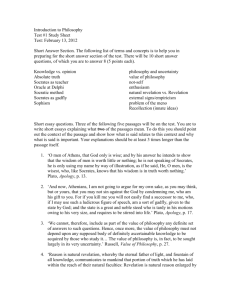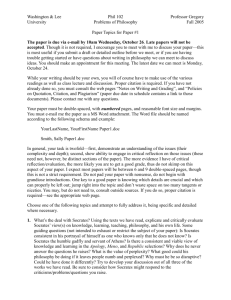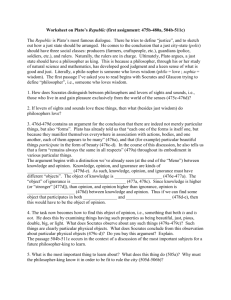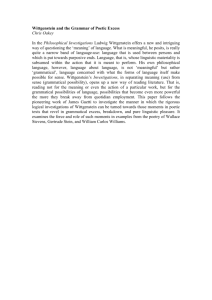Topic 1 The Nature of Questions
advertisement
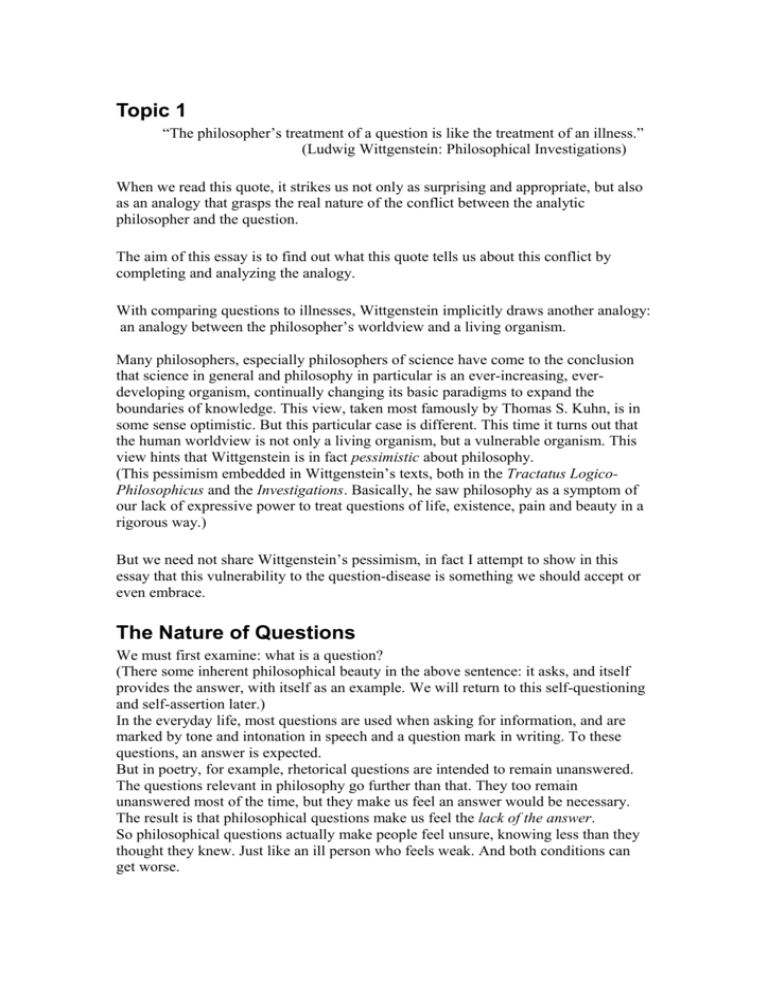
Topic 1 “The philosopher’s treatment of a question is like the treatment of an illness.” (Ludwig Wittgenstein: Philosophical Investigations) When we read this quote, it strikes us not only as surprising and appropriate, but also as an analogy that grasps the real nature of the conflict between the analytic philosopher and the question. The aim of this essay is to find out what this quote tells us about this conflict by completing and analyzing the analogy. With comparing questions to illnesses, Wittgenstein implicitly draws another analogy: an analogy between the philosopher’s worldview and a living organism. Many philosophers, especially philosophers of science have come to the conclusion that science in general and philosophy in particular is an ever-increasing, everdeveloping organism, continually changing its basic paradigms to expand the boundaries of knowledge. This view, taken most famously by Thomas S. Kuhn, is in some sense optimistic. But this particular case is different. This time it turns out that the human worldview is not only a living organism, but a vulnerable organism. This view hints that Wittgenstein is in fact pessimistic about philosophy. (This pessimism embedded in Wittgenstein’s texts, both in the Tractatus LogicoPhilosophicus and the Investigations. Basically, he saw philosophy as a symptom of our lack of expressive power to treat questions of life, existence, pain and beauty in a rigorous way.) But we need not share Wittgenstein’s pessimism, in fact I attempt to show in this essay that this vulnerability to the question-disease is something we should accept or even embrace. The Nature of Questions We must first examine: what is a question? (There some inherent philosophical beauty in the above sentence: it asks, and itself provides the answer, with itself as an example. We will return to this self-questioning and self-assertion later.) In the everyday life, most questions are used when asking for information, and are marked by tone and intonation in speech and a question mark in writing. To these questions, an answer is expected. But in poetry, for example, rhetorical questions are intended to remain unanswered. The questions relevant in philosophy go further than that. They too remain unanswered most of the time, but they make us feel an answer would be necessary. The result is that philosophical questions make us feel the lack of the answer. So philosophical questions actually make people feel unsure, knowing less than they thought they knew. Just like an ill person who feels weak. And both conditions can get worse. In philosophy, one defeated by the questions is lost. If he cannot answer important questions, he will sooner or later find himself in a widespread theoretical, that is, moral, aesthetical, epistemological crisis. I will call this crisis the question-disease. Socrates and the archetypical question The ancient Greek philosopher Socrates, basically the spiritual founder of classical Greek philosophy, was known as the gadfly of Athens. This was because he walked up to people and bothered them with questions, like a gadfly bothers the animals by drinking their blood (note that the gadfly is a parasite, almost like an illness). These questions were seemingly trivial, but it turned out that not even those considered the wisest could come up with a satisfying answer. The general form of the Socratic question is: “what is X?” where X is any word we think we can define but in reality, we can’t. These questions upset Socrates’ contemporary society. Their worldview, which they thought was simple and natural, turned out to be vulnerable to the Socratic questiondisease. It is worthwhile to note on thing: that these questions weren’t complicated: they were as simple and natural as the worldview itself. But they had no answer within the limits of the pre-Socratic world. (Wittgenstein’s reaction to this phenomenon is stating that “the limits of my language are the limits of my world”) This “disease” attacked at many point at once. Once one part of the accepted worldview, like the definition of courage as “standing firm in the battle”, falls, many other weaknesses in the worldview appear, and Socrates is eager to question those too. Friedrich Nietzsche, in his early work The Birth of Tragedy describes how the simple and reasonable questions of Socrates have destroyed the ancient world whose philosophy was marked by the pre-Socratic philosophers, and whose Dionysian feeling of life was expressed in the dramas of Aeschylus. The analogy is: once the hard questions have gotten into the foundations of our worldview, that worldview is bound to die very soon. Is there a cure? If a question is an illness, can we cure it or not? Of course, we know simple questions can be settled with proper reasoning. But can all questions be settled in that way? The early, optimistic Wittgenstein stated in his Tractatus Logico-Philosophicus that if a question can be asked properly, then it can be answered. But later he himself has realized that the answer is quite clearly: no. Not all questions can be answered. So just as there are incurable diseases, there are “incurable” questions: these questions, once asked, will necessarily undermine our worldview. A mathematical analogy, while only covers an aspect of the general problem, has the advantage that it can be proved: This mathematical analogy is Gödel’s first incompleteness theorem: A recursively enumerable system of axioms containing a model of the Peano axioms cannot be both consistent and complete. In non-technical language, it means that if 1) the system is comprehensible 2) the system is capable of expressing basic arithmetic ( as defined by Peano ) then we basically have a choice: either the system is inconsistent, that is, it contains a contradiction, or it is incomplete, in the sense that it contains a statement which can neither be proved or disproved. So that the question “is this statement true?” has no answer. We see that, even in mathematics, which is much simpler than life, we cannot escape the question-disease. So we cannot escape in the much more complex philosophical world either. But by examining how Gödel’s undecidable sentence is constructed, we can see how these questions emerge in mathematics. Gödel, in fact, found a way of numbering formal statements and formal proofs. Then he formulates an arithmetic statement that asserts in a tricky way that it itself has no proof. This sentence cannot be proved to be true, because then it would be false, and cannot be proved to be true because then it would have no proof. While self-reference is not allowed in logic ( to defend against paradoxes like “this sentence is false” ), Gödel found a way to circumvent these defenses, and use selfreference in disguise. ( This is where “what is a question?” returns to us: it is beautifully self-referential in disguise ) We might be tempted to consider this undecidable statement to be true. But by this act, we created another system of axioms that will have a new undecidable statement. ( we have a completely different path: to accept contradictions in our system; I will return to that later ) The evolution of questions and answers In philosophy, the above argument would look like the following: Whenever Socrates asks a question, and other people come up with an answer, Socrates asks another question, mostly because the answer contained another vaguely defined notion. So when the defensive side seemingly solves the problem, a deeper question points out another problem. With even deeper questions and even deeper answers, we “descend” from aesthetics to ethics, from ethics to metaphysics, from metaphysics to epistemology, from epistemology to the study of consciousness, and so on perpetually. With an illness analogy, with the corresponding philosophical notions in parentheses: If someone ( the society ) is seriously ill ( internal moral conflict ) due to bacteria ( hard questions ), the doctor ( the philosopher/scientist ) will give me antibiotics ( answers ). It destroys most of the bacteria, but some might remain, and begin to multiply again (a few unsolved questions give rise to many others). These new bacteria will now be resistant to the antibiotics administered, because they are descendants of the few survivors. New antibiotics ( new answers ) have to be invented and applied. The result is that bacteria will co-evolve with the antibiotics. A resistant strain of bacteria forces application of other antibiotics and new antibiotics force natural selection between the bacteria to produce a resistant strain. Likewise, new questions force new answers, the new answers will give rise to new questions because the answers are incomplete (contain other undefined notions, for example). This coevolution is similar to T. S. Kuhn’s theory of paradigms, but there, not an accumulation questions, but accumulation of contradictory evidence forces the change of paradigms. One cannot be sure whether evidence will support a theory or disprove it, but in philosophy, one can be sure there always will be new undecidable questions, like the ones guaranteed by Gödel. Three choices When attacked by questions, we are inclined to defend our worldview, defend what we believe in. But from the mathematical example, we know that it is impossible. Mathematicians have since then learned to cope with Gödel’s incompleteness theorem in their profession by adopting a skeptical point of view, that says nothing about philosophy. But when practicing philosophy, we must decide how to relate to these incurably hard questions. There are basically three positions a philosopher can take: Philosophical Fortification With some simplification, this is the side of the early Wittgenstein. In the Tractatus, he tries to construct a defensive system, one that can withstand being sieged by questions like “what is the meaning of life?”, one that can answer meaningful questions, and can dismiss questions it can’t answer as faults of the language. He tries to convince that it is not wise to wander outside this fortress, as a philosopher. We shall enjoy what is sublime in music, but we shall never attempt to examine it philosophically. Besides Wittgenstein, it is the side of all great philosophers who attempted building philosophical framework. Closest to Socrates is Plato, whose system of Forms was intended as a way of settling these questions by placing transcendent notion in another world. But, with the analogy of fortification, the story of the Tower of Babel comes to our mind. The aim is to build, a great “fortress”, one that forms a complete system, and more or less applies to the human experience. But, as in the Biblical story, the builderphilosophers disagree on how the fortress should be like, and sometimes they do not even understand each other: both Wittgenstein and Heidegger have been trying to build a strong and complete system, but their words, methods and goals are completely different. In summery, these philosophers are naively, desperately, or heroically trying to do a task they cannot accomplish, like Sisyphus of the Greek mythology. Irrational neutrality This is the option we did not discuss in mathematics: we may choose to accept a contradicting system of axioms, thereby invalidating logic, even in everyday life. While this viewpoint avoids the conflict between the question-disease and the living organism, it leads to an absurd stance to life. If we accept these, we must place our trust somewhere else. For example, Nietzsche’s Übermensch asserts his own truth and values, and if strong, he will not fall victim to Socratic questions, however reasonable they might be. If he decides not to ask a certain question, like pre-Socratic Athenians refrained from asking Socratic questions before Socrates’ time, he will simply not ask it from himself, and will not listen to anyone who does. Or, we can be like the Abraham described by Kierkegaard in his Fear and Trembling: we must have extreme faith to compensate for our loss of reason. His reason says that he shouldn’t sacrifice his son, but for him, this reason means nothing. To him, it is God’s word that is absolute alone. Welcome the Question-Disease This is what the archetypical Socrates does. It is important that Socrates did not attempt to answer his questions. He was in the state of constant self-questioning, a living question mark. In spite of this, we don’t know his real, internal answers to his own question. His fellow Athenians considered his questions offensive only because prior to Socrates, they found comfort in not being questioned. Socrates, by contrast, found and exhibited wisdom in and by the act of asking hard questions. The Organism and its Cancer We shall complete the analogy with some final observations. If philosophy is a living organism that is vulnerable to questions, who takes which part? Those who choose the first option, try to fortify those organism’s defenses to be as strong as possible. They are like the immune system of the organism. It cannot provide full protection, but it really lengthens the lifetime of the organism. In the former examples, I used the analogy of a bacterial disease, but the questiondisease is rather like cancer. While bacteria form an external threat to the organism, cancer is an internal. Although, the immune system combats both, cancer is much harder to treat because while bacteria can be easily identified as alien to the organsim, and thus targeted specifically, cancer is almost impossible to destroy the cancer without destroying the organism with it. This makes most forms of cancer incurable in the real world, unfortunately. The moral of Gödel’s theorem is that the undecidable question is born from the system itself, like cancer cells are from the organism itself. Every system carries in itself the seeds of its eventual demise. The simple and natural thought of the pre-Socratic Athenians fell to the simple and natural question of Socrates. In the French Revolution, the “do the common good” idealism eventually fell to the the question “what is the common good”. In these times, liberal democracy is struggling to answer its own hard question: what to do with those who reject liberal democracy? This was already formulated around the middle of the 20th century in Karl Popper’s The Open Society and Its Enemies, but became very apparent in the late 20th century and into the 21st century. As the undecidability is born within the system, it cannot be eliminated without damaging the system. In the philosophical world, this is like how it is impossible to dismiss “what is courage?” without dismissing courage itself. This is why Socrates was so effective in destroying the Greek era of thought which we call, not by coincidence, pre-Socratic. Conclusion Now that we see the sides of the conflict, and know which side has which role, we might be asked: which side shall we support? This must be a personal decision, depending on one’s personality traits and talents. If one has an inclination to strive to be build a well-founded and strong system, even if he knows he cannot achieve perfection, he should go with the first option. Most analytic philosophers have chosen this path. If one finds that he has no need of formal reason at all, he can go with the second option, departing from the standard philosophical questioning process, and wandering past reason into deeper and more dangerous areas of human existence, like Nietzsche and Kierkegaard did. The third option is certainly the most interesting. It requires us to ask, not to answer. So one might think it is mindless process. It can surely be done without thinking. In today’s western society questioning other peoples’ notions and values became an standard tool of rebellion. But we must keep in mind that Socrates was exhibiting wisdom, not rebellion. That was the reason he was executed: his contemporary society couldn’t see the difference between questioning out of wisdom and questioning out of rebellion. It seems that our society can’t see that difference either.

